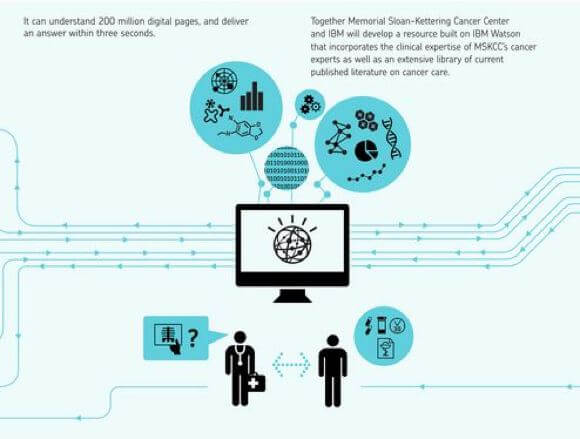
IBM has partnered with WellPoint, Inc. and Memorial Sloan-Kettering Cancer Center to train Watson in oncology and utilization management. A team of clinicians and technicians spent thousands of hours “teaching” Watson how to process, analyze, and interpret complex clinical information through natural language processing. The hope is that Watson can help raise the quality of healthcare and make it more efficient.
Watson brings its ability to process huge amounts of information to evidence-based medicine. It’s first course focused on lung cancer. It went through a year and a half of training during which it boned up on the information in some 600,000 medical publications from 42 medical journals and clinical trials focused on lung cancer treatments. In addition, Watson accessed the 1,500 lung cancer cases in Memorial Sloan-Kettering’s digitized database and a team of clinicians and analysts trained Watson to identify and interpret case notes made by doctors, lab results and associated clinical research. The material also included the latest in genetics cancer research, a starting point for a future in which treatments are tailored to the genetic makeup of individual patients.
Watson’s program, called “Interactive Care Insights for Oncology,” will produce answers to doctors’ queries in the same way Watson answered questions from contestants during its victorious run on Jeopardy!, by producing an extensively cross-referenced series of answers, and assigning a confidence score to each answer. It needs only seconds to comb through decades-long cancer treatment histories of 1,500 patients and suggest a treatment. From there, it’s up to the doctor to decide.

The oncology program is only the first from Watson. Programs that focus on other diseases will follow, eventually building a series of medical Watson-based technologies. And IBM has not only boosted Watson’s mind, but its body as well. Whereas once it took an entire room to house all of Watson’s cognitive machinery, it now runs from a single IBM Power 750 server. One day Watson may very well be compact and mobile enough to tag alongside doctors while they make their rounds.
While some old school physicians may balk at the idea of a computer telling them how to treat their patient, early on enthusiasm for Watson appears high. Wellpoint expects the system to be used by some 1,600 healthcare providers by the end of the year.
After heart disease, cancer is the leading cause of death in the United States. Nearly 1.7 million new cancer cases will be diagnosed in the US this year, according to the American Cancer Society. Because of the difficulty in accessing the vast amounts of pertinent data, estimates suggest that one in five patients are diagnosed incorrectly or incompletely. And the fact that the amount of medical information is doubling every five years means it’ll only get harder for caregivers to stay current. But according to Moore’s Law, the rate of computing power is more than sufficient to keep up with the growth of medical information. Now, with Watson, we have the tool to put that power to work.
[Source: ibmbusinessanalytics via YouTube]



